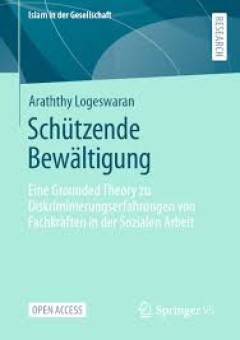Filter by

Ethnicity and the Colonial State
Ethnicity and the Colonial State analyses, through a comparison of three West African communities (Wolof, Temne, and Ewe), the ways in which ethnic labels and arguments are used (or omitted) in dealings with colonial administrations. It follows these strategies and choices over more than a century, between the conquest periods and independence. Where state structures were weak as a factor of gr…
- Edition
- -
- ISBN/ISSN
- 978-90-04-30735-3
- Collation
- oer.unej.ac.id
- Series Title
- Studies in Global Social History, Volume: 22
- Call Number
- -

Cultural Competence and the Higher Education Sector = Australian Perspectives…
This open access book explores cultural competence in the higher education sector from multi-disciplinary and inter-disciplinary perspectives. It addresses cultural competence in terms of leadership and the role of the higher education sector in cultural competence policy and practice. Drawing on lessons learned, current research and emerging evidence, the book examines various innovative appro…
- Edition
- 1
- ISBN/ISSN
- 9789811553622
- Collation
- XVII, 363 hlm; ill., lamp.,
- Series Title
- -
- Call Number
- -

Schützende Bewältigung
In diesem Open-Access-Buch wird eine qualitative Studie zum Thema Diskriminierungserfahrungen von Fachkräften der Sozialen Arbeit vorgestellt. Ziel der Arbeit ist es, eine gegenstandsverankerte Theorie abzubilden, die hilft, den Umgang mit Diskriminierungserfahrung – insbesondere Rassismuserfahrungen – zu beschreiben: Wie verhalten sich Betroffene in diskriminierenden Situationen? Wie gehe…
- Edition
- 1
- ISBN/ISSN
- -
- Collation
- -
- Series Title
- Islam in der Gesellschaft
- Call Number
- XV, 302

Arab Americans in the United States : Immigration, Culture and Health
This open access book provides a unique perspective on the relationship between immigration, culture, and health. It presents a cross-cultural perspective between culture and illness. It touches upon identity struggles, the notion of not feeling “safe, understood, accepted,” and its relation to Arab American health. The book provides a comprehensive review of the history of Muslims in Ameri…
- Edition
- -
- ISBN/ISSN
- 978-981-99-7417-7
- Collation
- XI, 107
- Series Title
- International Perspectives on Migration (IPMI)
- Call Number
- -

Men's Experien
This open access book draws on a broad study on violence against men, from both male and female partners in Norway, to contribute to the research on intimate partner violence. It identifies similarities in men's experiences and backgrounds, including in their perceptions of their own victimisation. Marianne Inez Lien and Jørgen Lorentzen argue that the traditional gender power model should be …
- Edition
- 1
- ISBN/ISSN
- 978-3-030-03994-3
- Collation
- -
- Series Title
- Palgrave Studies in Victims and Victimology
- Call Number
- XI, 174

Ethnomusicology, Queerness, Masculinity
This open access book explores the disciplinary, disciplined, and recent interdisciplinary sites and productions of ethnomusicology and queerness, arguing that both academic realms are founded upon a destructive masculinity—indissolubly linked to coloniality and epistemic hegemony—and marked by a monologic, ethnocentric silencing of embodied, same-sex desire. Ethnomusicology’s fetishizati…
- Edition
- -
- ISBN/ISSN
- 978-3-031-15313-6
- Collation
- X, 240
- Series Title
- -
- Call Number
- -

'The Bell Curve' in Perspective
This open access book examines the implications of The Bell Curve for the social, economic, and political developments of the early 21st century. Following a review of the reception of The Bell Curve and its place in the campaign to end affirmative action, Professor Tucker analyses Herrnstein’s concept of the “meritocracy” in relation to earlier 20th century eugenics and the dramatic incr…
- Edition
- -
- ISBN/ISSN
- 978-3-031-41614-9
- Collation
- XIII, 124
- Series Title
- -
- Call Number
- -

Genomic citizenship :the molecularization of identity in the contemporary Mid…
"In the contemporary Middle East, genetics research on ethnic populations is changing the way groups understand and imagine their ethnic identities and places of belonging"--OCLC-licensed vendor bibliographic record.
- Edition
- -
- ISBN/ISSN
- 0262366703
- Collation
- 1 online resource.
- Series Title
- -
- Call Number
- -

Kinds come first :age, gender, class, and ethnicity give meaning to measures
An argument that the meaning of a psychological or biological measure depends on the age, gender class, and ethnicity of the human subject.OCLC-licensed vendor bibliographic record.
- Edition
- -
- ISBN/ISSN
- 9780262355049
- Collation
- 1 online resource (216 pages)
- Series Title
- -
- Call Number
- -

(Mis)Informed: What Americans Know About Social Groups and Why it Matters for…
This Element examines just how much the public knows about some of America's most stigmatized social groups, who comprise 40.3% of the population, and evaluates whether misinformation matters for shaping policy attitudes and candidate support. The authors design and field an original survey containing large national samples of Black, Latino, Asian, Muslim, and White Americans, and include measu…
- Edition
- -
- ISBN/ISSN
- 9781108882224
- Collation
- -
- Series Title
- -
- Call Number
- -
 Computer Science, Information & General Works
Computer Science, Information & General Works  Philosophy & Psychology
Philosophy & Psychology  Religion
Religion  Social Sciences
Social Sciences  Language
Language  Pure Science
Pure Science  Applied Sciences
Applied Sciences  Art & Recreation
Art & Recreation  Literature
Literature  History & Geography
History & Geography